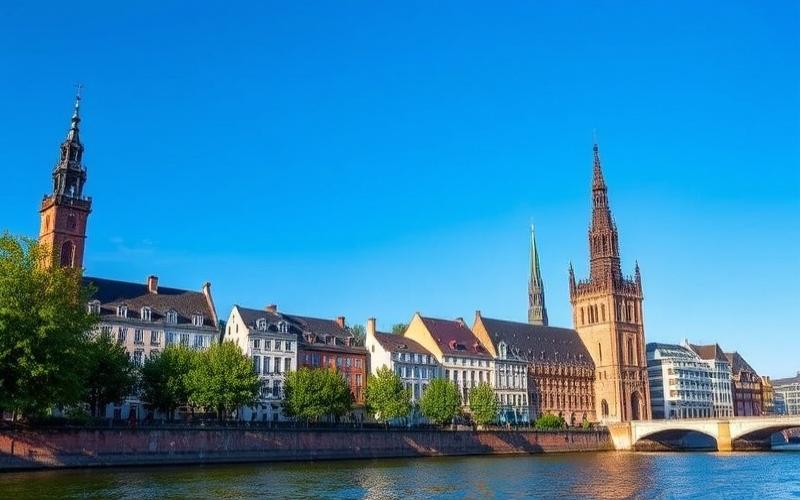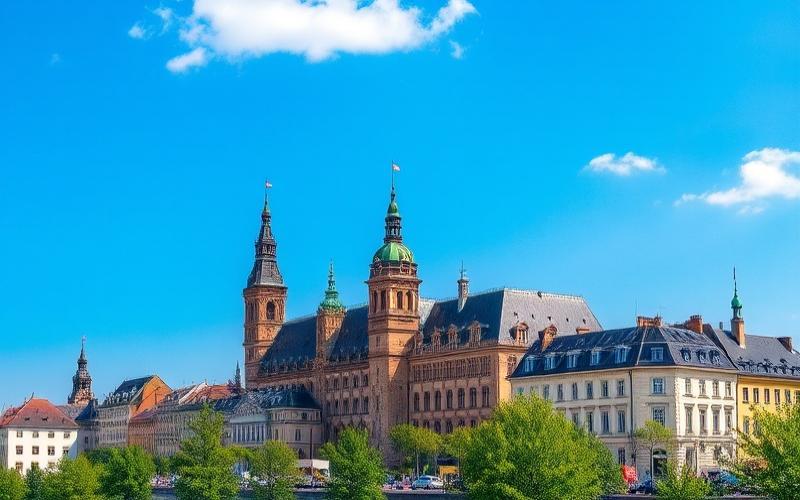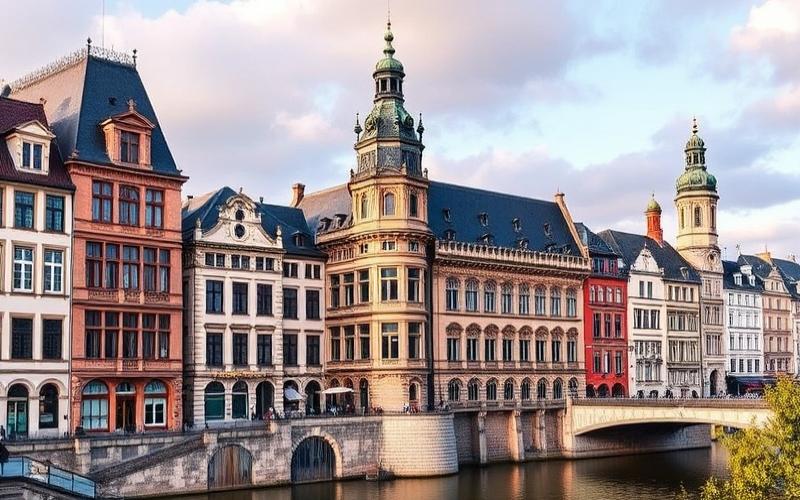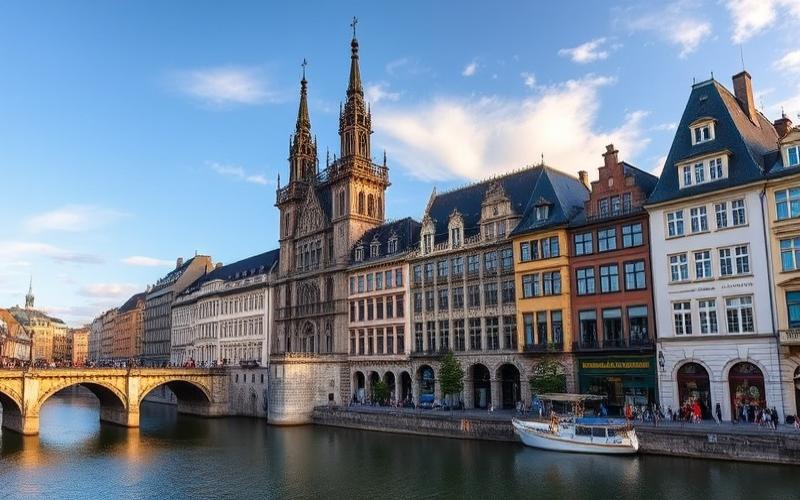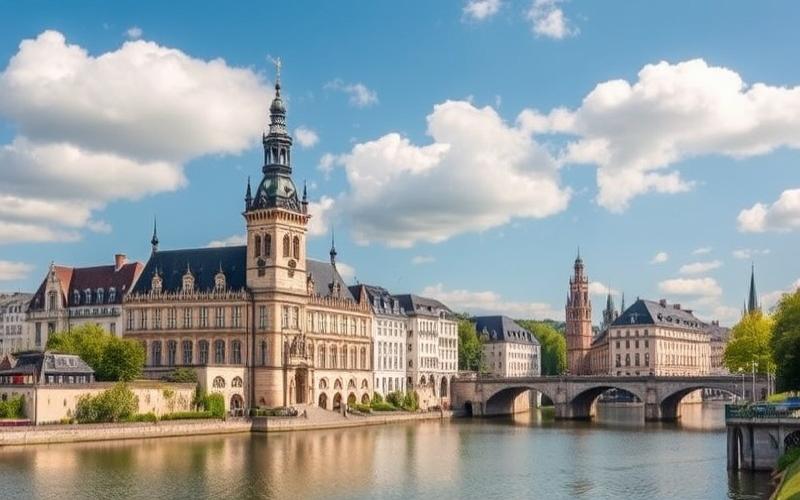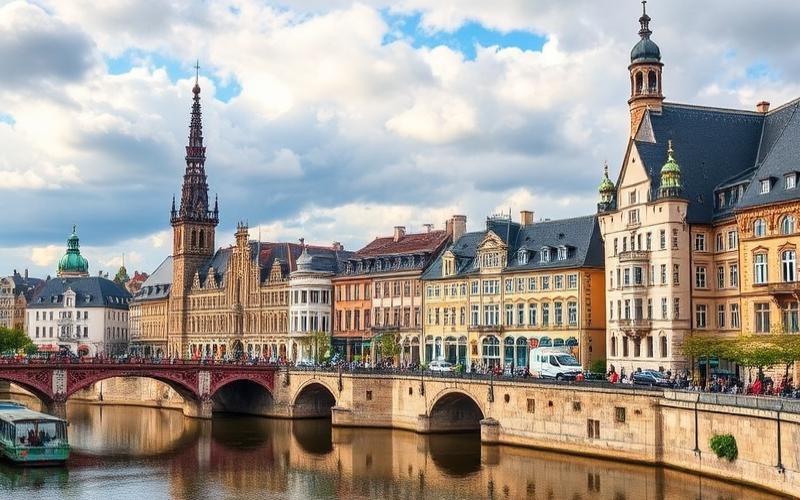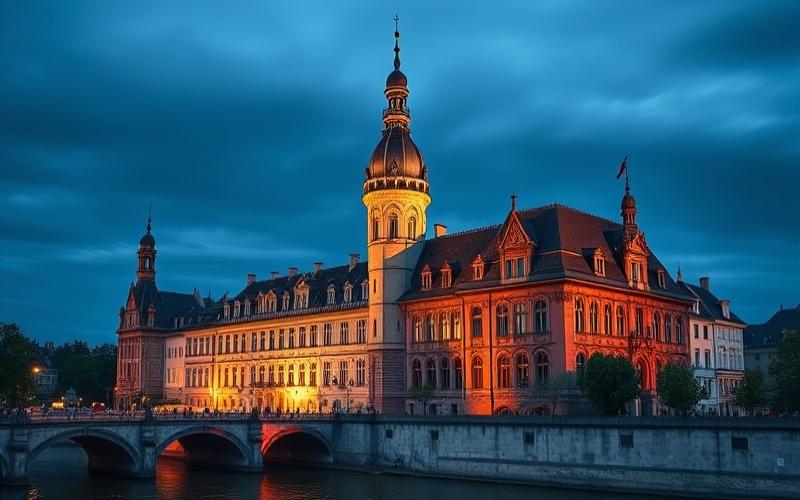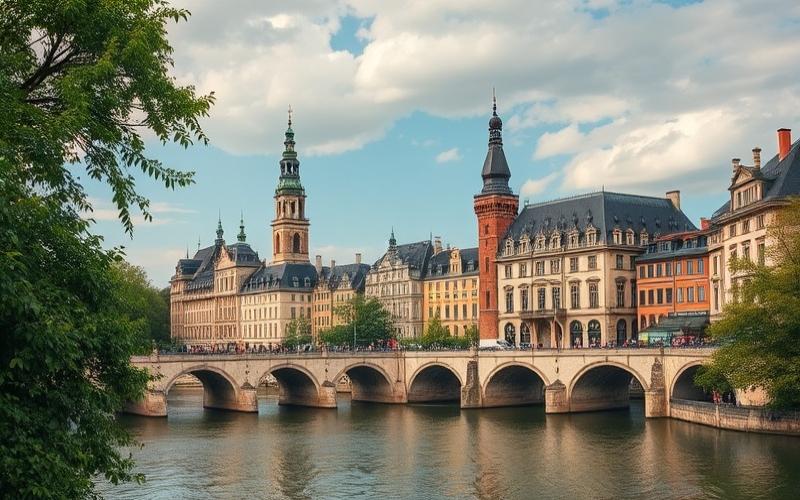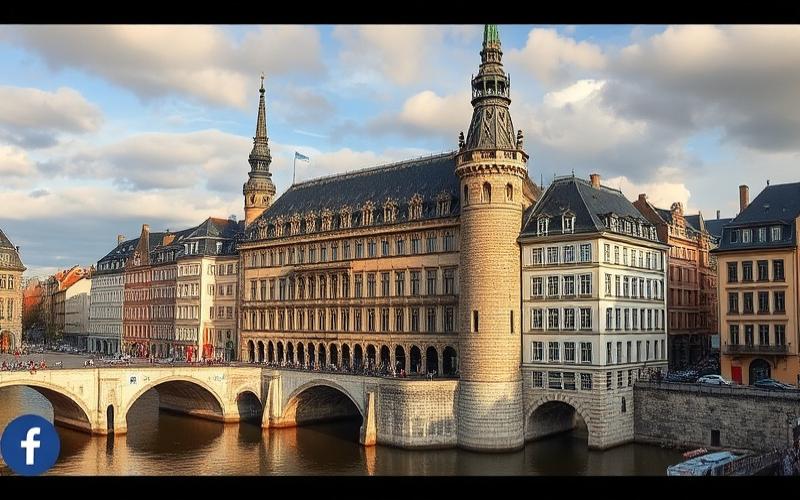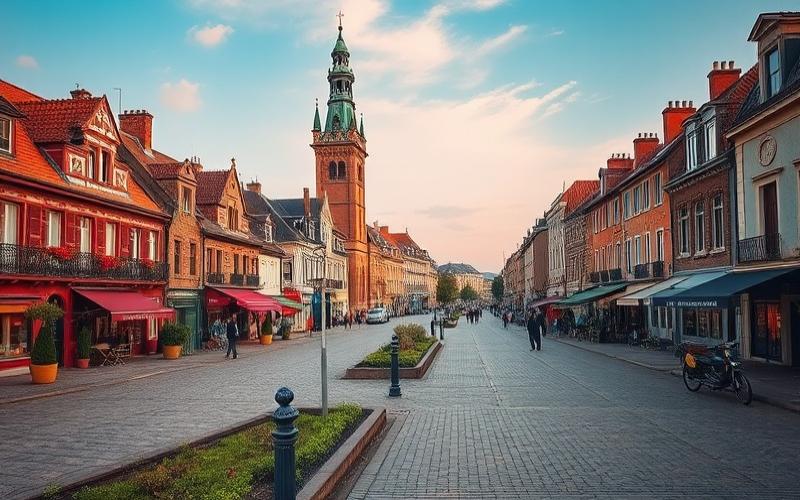
 Published on and written by Cyril Jarnias
Published on and written by Cyril Jarnias
Luxembourg, a small country at the heart of Europe, has long been recognized as a premier international financial center. But beyond its reputation in banking, the Grand Duchy also offers enticing opportunities in the commercial real estate sector. With a stable economy, strategic geographic location, and favorable regulatory environment, Luxembourg is attracting increasing numbers of real estate investors from around the world. In this article, we will explore in detail the various facets of investing in Luxembourg’s commercial real estate, highlighting the opportunities, risks, and trends shaping this dynamic market.
A Diverse Range of Commercial Properties
The commercial real estate market in Luxembourg is characterized by great diversity of assets, offering investors a wide choice for diversifying their portfolio. This variety addresses different investment needs and strategies, whether for generating stable rental income or aiming for long-term capital appreciation.
Office Space: The Pillar of Luxembourg Commercial Real Estate
The office sector undoubtedly constitutes the most important and dynamic segment of Luxembourg’s commercial real estate market. Demand for modern, well-located workspaces remains strong, driven by the continued growth of the financial sector and the arrival of new international companies. Business districts like Kirchberg, Cloche d’Or, and Luxembourg City’s downtown concentrate a large portion of the high-end supply.
Shopping Centers and Retail: An Evolving Sector
Although facing challenges related to the rise of e-commerce, Luxembourg’s retail sector continues to offer interesting opportunities. Well-located shopping centers and prime locations on the main shopping streets in the country’s major cities remain attractive to international brands. Furthermore, there’s a trend toward creating innovative concepts blending retail, dining, and entertainment to attract customers seeking experiences.
Logistics Real Estate: A Booming Sector
With its central geographic position in Europe and developed transportation infrastructure, Luxembourg is seeing its logistics sector develop rapidly. Modern warehouses and logistics platforms are increasingly sought after, particularly in areas near major roadways and Luxembourg-Findel Airport.
Hospitality and Managed Residences: Promising Niches
Luxembourg’s hospitality sector, driven by business and leisure tourism, offers interesting investment opportunities, particularly in the high-end and luxury segments. Additionally, the development of managed residences, such as student housing or senior living facilities, addresses growing demand and can constitute an attractive alternative for investors.
Good to Know:
The Luxembourg commercial real estate market is characterized by great diversity of assets, ranging from prestigious offices to modern logistics warehouses, including innovative shopping centers and high-end hotels. This variety allows investors to find opportunities suited to their risk profile and return objectives.
Profitability and Risks: Finding the Right Balance
Investing in commercial real estate in Luxembourg can prove very profitable, but like any investment, it also carries risks that should be carefully assessed.
Attractive Returns in a Low-Rate Environment
In an environment of historically low interest rates, Luxembourg commercial real estate offers relatively attractive rental yields compared to other asset classes. Prime yields for quality offices in the best locations generally range between 3.5% and 4.5%, while logistics assets or suburban retail can offer slightly higher yields, around 5% to 6%.
Long-Term Appreciation Supported by Economic Growth
Beyond rental income, investors can also aim for long-term capital appreciation on their real estate assets. Luxembourg’s sustained economic growth, combined with limited land supply, contributes to regular appreciation of real estate values, particularly in the most sought-after areas.
Risks Not to Overlook
Despite its strengths, investing in Luxembourg commercial real estate is not without risks. Among the main factors to consider are:
- Market cyclicality: Like any real estate market, Luxembourg’s is subject to cycles that can affect values and vacancy rates.
- Dependence on the financial sector: A significant portion of demand for office space comes from the financial sector, which can make the market vulnerable in case of a crisis in this sector.
- Regulatory developments: Changes in tax or urban planning regulations can have a significant impact on investment profitability.
- International competition: Luxembourg must constantly position itself against other European financial centers to attract businesses and investors.
Strategies to Optimize Risk/Reward Ratio
To maximize opportunities while minimizing risks, savvy investors typically adopt several strategies:
- Diversification: By investing in different types of assets and in different geographic areas within Luxembourg, one can reduce exposure to risks specific to one sector or location.
- Tenant quality: Prioritizing financially strong tenants committed to long-term leases can ensure stable income and reduce vacancy risk.
- Anticipating trends: Investing in assets meeting new user expectations (flexible offices, green buildings, etc.) can offer a long-term competitive advantage.
- Active management: Professional asset management, including regular renovations and optimization of expenses, can help maintain property attractiveness and profitability.
Good to Know:
Luxembourg commercial real estate offers attractive returns in a low-rate environment, with prospects for long-term capital appreciation. However, thorough risk analysis and a well-thought-out investment strategy are essential to optimize the risk/reward ratio.
Trends Shaping the Market’s Future
The Luxembourg commercial real estate market is constantly evolving, influenced by global trends and local specificities. Understanding these dynamics is crucial for investors wishing to anticipate future opportunities.
Digital Transformation and the Rise of Flex Office
The COVID-19 pandemic accelerated the transformation of work modes, with massive adoption of teleworking and growing demand for flexible office spaces. This trend continues in Luxembourg, with increased demand for modular offices, coworking spaces, and hybrid solutions. Investors must therefore rethink their approach to office assets, favoring adaptable buildings equipped with advanced technological infrastructure.
Focus on Sustainability and Environmental Performance
Luxembourg has set ambitious sustainable development goals, which is reflected in the real estate sector. Green buildings, certified BREEAM or LEED, are increasingly sought after by tenants and investors. This trend is expected to intensify in the coming years, with stricter energy efficiency regulations and growing awareness of environmental issues.
Revitalization of City Centers and Development of Mixed-Use Districts
Facing challenges of traditional retail, there’s a trend toward revitalizing Luxembourg’s city centers, with the development of innovative concepts blending retail, dining, entertainment, and cultural spaces. Furthermore, mixed-use district projects, combining offices, housing, retail, and services, are gaining popularity, offering new investment opportunities in integrated real estate complexes.
E-commerce Growth and Its Impact on Logistics
The continued growth of e-commerce is stimulating demand for modern, well-located logistics spaces. There’s a trend toward larger, more automated warehouses, as well as the development of urban distribution centers to meet rapid delivery needs. This evolution opens new perspectives for investors in the logistics sector.
Increasing Market Internationalization
Luxembourg’s commercial real estate market is attracting increasing numbers of international investors, drawn by the country’s economic stability and its status as a European financial hub. This internationalization contributes to the market’s professionalization and the adoption of international standards in asset management and reporting.
Technological Innovation in Real Estate Management
The adoption of innovative technologies in real estate management, such as the Internet of Things (IoT) to optimize energy consumption, or the use of virtual reality for marketing spaces, is becoming increasingly common. Investors who embrace these innovations can gain operational efficiency and attractiveness to tenants.
Good to Know:
The Luxembourg commercial real estate market is undergoing significant transformation, with marked trends toward flexibility, sustainability, and technological innovation. Investors who can anticipate and adapt to these changes will be best positioned to seize future opportunities.
Conclusion: A Promising Market for Savvy Investors
Commercial real estate in Luxembourg presents attractive potential for investors seeking stable returns and long-term growth prospects. The diversity of available assets, combined with the country’s economic strength and its status as an international financial center, offers fertile ground for varied investment strategies.
However, as with any real estate market, successful investment in Luxembourg depends on a thorough understanding of local dynamics, rigorous analysis of opportunities and risks, and the ability to anticipate future trends. Investors who can navigate this complex environment, adapting to new requirements for flexibility, sustainability, and innovation, will be best placed to take advantage of the opportunities offered by this dynamic market.
In a global context marked by uncertainty, Luxembourg continues to position itself as a prime destination for commercial real estate investment, offering an attractive balance between stability and growth potential. Whether for diversifying an international portfolio or establishing a presence at the heart of Europe, the Luxembourg market certainly deserves the attention of savvy investors.
Disclaimer: The information provided on this website is for informational purposes only and does not constitute financial, legal, or professional advice. We encourage you to consult qualified experts before making any investment, real estate, or expatriation decisions. Although we strive to maintain up-to-date and accurate information, we do not guarantee the completeness, accuracy, or timeliness of the proposed content. As investment and expatriation involve risks, we disclaim any liability for potential losses or damages arising from the use of this site. Your use of this site confirms your acceptance of these terms and your understanding of the associated risks.







